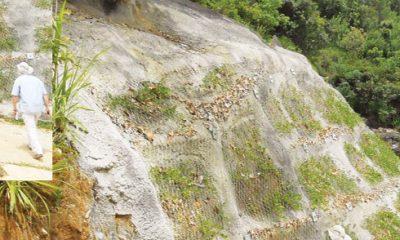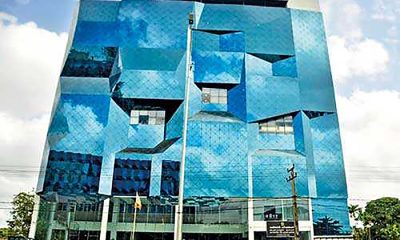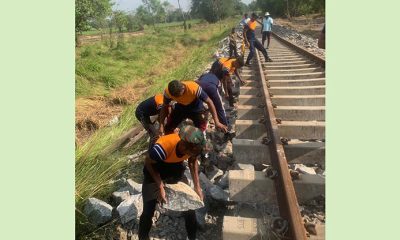News
FM: UNHRC on political campaign against SL

… points out duplicity of some members
Foreign Minister Dinesh Gunawardena yesterday (23) said double standards adopted by some countries would undermine the global fight against terrorism. Minister Gunawardena said so delivering the country statement at the 46th session of the Geneva based UNHRC. He spoke using video technology.
Minister Gunawardena said there was an unprecedented propaganda campaign against Sri Lanka on the basis of the report of Office of the High Commissioner for Human Rights (OHCHR).
The Minister said that he would leave it to the members and observers of this Council to make their own judgment on whether Sri Lanka represented a situation that warranted the urgent attention of this Council, or if this campaign was essentially a political move that contravenes the very values and principles on which this Council has been established. Particularly at a time when legislation is enacted by some countries to protect their soldiers from prosecution in military operations carried out overseas, only points to duplicity and the hypocritical nature of their motives. This cannot but result in a significant loss of morale among countries engaged in the struggle against terrorism.
The following is the full text of the statement: “Sri Lankan heroic armed forces militarily neutralized the LTTE in 2009 after three-decades of conflict. The Sri Lanka Government acted in self-defense to safeguard the unitary state, sovereignty and territorial integrity from the world’s most ruthless separatist terrorist organization.
The LTTE is the only terrorist organization in the world which has killed two world leaders: a serving President of Sri Lanka and a former Prime Minister of India extending its terror beyond the borders of Sri Lanka.
End of terrorism guaranteed the most cherished of all human rights – right to life of all Sri Lankans – Sinhala, Tamil, and Muslims.
Nonetheless hegemonic forces colluded against Sri Lanka in bringing an unsubstantiated resolution against Sri Lanka which was defeated by the support of friendly nations who remain by Sri Lanka’s side even today. Further resolutions were presented to this Council on purely political motives. In each instance Sri Lanka presented the procedural improprieties, and how such processes could set a dangerous precedent affecting all member states of the United Nations.
The Government which assumed office in Sri Lanka in 2015, in a manner unprecedented in human rights fora, joined as co-sponsors of Resolution 30/1 which was against our own country. It carried a host of commitments that were not deliverable and were not in conformity with the Constitution of Sri Lanka. This led to the compromising of national security to a point of reviving terrorist acts on Easter Sunday 2019 causing the deaths of hundreds. The rejection of this resolution by the peoples of Sri Lanka was clearly manifested in the mandate received by His Excellency President Gotabaya Rajapaksa in November 2019. Based on this mandate I announced at the 43rd session of this Council that Sri Lanka would withdraw from co-sponsorship of the resolution. I also stated that Sri Lanka would remain engaged with the UN system including this Council.
We have provided detailed updates to the OHCHR in December 2020 as well as in January 2021 on the progress of implementation of commitments that Sri Lanka had undertaken such as continuity of the existing mechanisms, appointment of a special commission of inquiry headed by a Supreme Court Judge, achieving the SDGs, progress made in returning lands, demining and creating new avenues of livelihoods.
These steps have been taken even as Sri Lanka was battling the effects of the COVID-19 pandemic for the past one year. In spite of these challenges we held a free and fair general election in August 2020 and elected a new Government with a two-thirds majority in one of Asia’s oldest Parliamentary democracies.
It is regrettable that despite the spirit of cooperation with the HRC and its mechanisms, elements working against Sri Lanka intend to table another country-specific resolution based on this OHCHR Report. This rejected report by Sri Lanka has unjustifiably broadened its scope and mandate further, incorporating many issues of governance and matters that are essentially domestic in any self-respecting, sovereign country.
I leave it to the members and observers of this Council to make their own judgment on whether Sri Lanka represents a situation that warrants the urgent attention of this Council, or if this campaign is essentially a political move that contravenes the very values and principles on which this Council has been established. Particularly at a time when legislation is enacted by some countries to protect their soldiers from prosecution in military operations carried out overseas, only points to duplicity and the hypocritical nature of their motives. This cannot but result in a significant loss of morale among countries engaged in the struggle against terrorism.
The Council must hold the scales even. Not going by hearsay, unilateral action or one angled doubtful sources but adhere to its guiding principles. Insistence on such ever-expanding externally driven prescriptions notwithstanding our continuous cooperation and engagement with this Council can pose numerous challenges.
As the Council is aware this is a critical time to the entire world in the last hundred years where we need to be united in our efforts to overcome the Covid19 pandemic and to revive battered economies. I appeal to the members of this Council to take note of our continued engagement and cooperation on its merit and support us by rejecting any resolution against Sri Lanka. We believe that the extent to which the resources and time of this Council has been utilized on Sri Lanka is unwarranted, and carries a discouraging message to the sovereign states of the global South.
The need of the hour, in the face of an unprecedented pandemic, is solidarity rather than rancor and acrimony arising from divisions within this council. In view of the circumstances set out above, we urge that this resolution be rejected by the Council and be brought to closure.”
News
Rs 1. 3 bn yahapalana building deal under investigation

Several ex-Cabinet ministers questioned; Ranil, Sajith, too likely to be summoned
The Commission to Investigate Allegations of Bribery or Corruption (CIABOC) has initiated an inquiry into the shifting of the Agriculture Ministry situated at Rajamalwatte, to a building belonging to the D. P. Jayasinghe Group of Companies, at Rajagiriya, during the Yahapalana government.
The building was rented for a five-year period at a cost of over Rs 1 bn by the yahapalana government within months after the then President Maithripala Sirisena declared opened the 10-storey building complex.
The CIABOC yesterday morning recorded former yahapalana minister Gayantha Karunatilleke’s statement in connection with the investigation. Later in the day, CIABOC recorded the statement of SJB General Secretary Ranjith Maddumabanadara. Earlier CIABOC summoned former ministers Thalatha Atukorale, Wajira Abeywardena and Lakshman Kiriella. At the time of the finalisation of the deal, KIriella was in the UNP.
Sources said that former PM and President Ranil Wickremesinghe, too, was likely to be questioned in this regard. Responding to The Island queries, sources pointed out even SJB leader Sajith Premadasa was expected to be questioned.
The then Speaker Karu Jayasuriya is on record as having said that the building was rented in keeping with a decision taken by the government and not Parliament.
The UNP-SLFP coalition shifted the Agriculture Ministry to accommodate 16 Sectoral Oversight Committees therein.
Although the government paid as much as Rs. 21.5 mn monthly rent to D.P.A. Jayasinghe Company, the Agriculture Ministry failed to move in for over a year. The then Agriculture Minister Duminda Dissanayake sought Cabinet approval on Dec 1, 2015 to rent the building.
According to inquiries conducted earlier by the Presidential Commission appointed to probe state sector corruption, the Agriculture Ministry sought Cabinet approval for a new building after the then Prime Minister Wickremesinghe submitted a cabinet proposal on 21 September, 2015, to use the Agriculture Ministry building for Parliament’s sectoral oversight committees.
PM Wickremesinghe’s Secretary Saman Ekanayake has told the Commission that public funds could have been saved if the several vacant floors of Suhurupaya belonging to the Defence Ministry had been made available to the Agriculture Ministry.
By Shamindra Ferdinando ✍️
News
SL Railways suffers staggering losses; more than 2/3 of rail tracks out of service

Railway sources said that the damages caused to railway tracks could be more than USD 300 mn.
According to UNDP Rapid Crisis Assessment Sri Lanka’s railroad system, over 278 km of railways were exposed to cyclone-related flooding, including 35 railroad bridges nationwide. This figure reflects flooding only, but other hazards (such as localised debris, landslides, or damage to a single bridge) can also disrupt operations, meaning that even relatively small obstructions can render long stretches of railway non-operational. Like road exposure, railway exposure limits mobility and the capacity of affected populations to access key services and infrastructure.
At the level of divisional secretariats, Colombo and Thimbirigasyaya in Colombo District, Ja Ela in Gampaha District, as well as Mannar Town and Nanaddan in Mannar District all registered over 10 km of exposed railways each.
Commissioner-General of Essential Services B.K. Prabath Chandrakeerthi is on record as having said that only 478 kilometers of Sri Lanka’s 1,593-km railway network were currently usable following extensive damage caused by the recent cyclone.
News
US, SL advancing free, open, and resilient Indo-Pacific region: Embassy

Under Secretary of State for Political Affairs Allison Hooker arrived in Colombo yesterday (11) to underscore US interest in defence, trade and maritime security in line with their Indo-Pacific strategy.
The US embassy here issued the following statement: “Under Secretary Hooker will meet with Sri Lankan counterparts to discuss a wide range of bilateral issues, focused on deepening economic and commercial ties, strengthening defence cooperation, and supporting Sri Lanka’s economic and maritime sovereignty.
The United States and Sri Lanka share a strong and enduring partnership rooted in our mutual commitment to regional security, economic growth, and prosperity for our peoples. Through close cooperation on defence, trade, and maritime security, we are working together to advance a free, open, and resilient Indo-Pacific region.
As we continue to build on our strategic partnership, the United States also stands with the people of Sri Lanka as they respond to the devastating impacts of Cyclone Ditwah. We remain committed to working together to address both immediate challenges and long-term opportunities for our two nations, reflecting our ongoing commitment to the U.S.-Sri Lanka partnership.”
-

 Features3 days ago
Features3 days agoFinally, Mahinda Yapa sets the record straight
-

 News5 days ago
News5 days agoOver 35,000 drug offenders nabbed in 36 days
-

 News4 days ago
News4 days agoCyclone Ditwah leaves Sri Lanka’s biodiversity in ruins: Top scientist warns of unseen ecological disaster
-

 Business7 days ago
Business7 days agoLOLC Finance Factoring powers business growth
-

 News7 days ago
News7 days agoCPC delegation meets JVP for talks on disaster response
-

 News7 days ago
News7 days agoA 6th Year Accolade: The Eternal Opulence of My Fair Lady
-

 News5 days ago
News5 days agoRising water level in Malwathu Oya triggers alert in Thanthirimale
-

 Features6 days ago
Features6 days agoThe Catastrophic Impact of Tropical Cyclone Ditwah on Sri Lanka:



















